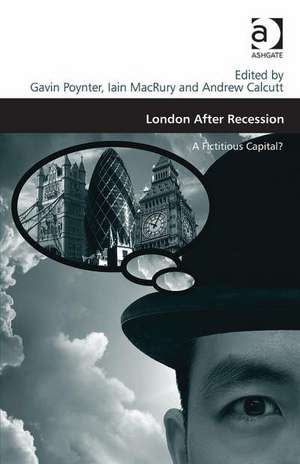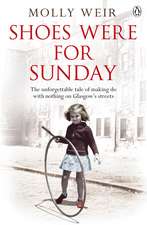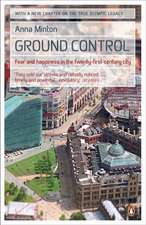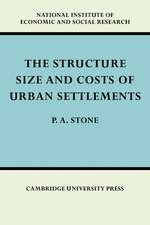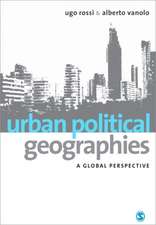London After Recession: A Fictitious Capital?
Autor Iain MacRury Editat de Gavin Poynteren Limba Engleză Hardback – 5 sep 2012
| Toate formatele și edițiile | Preț | Express |
|---|---|---|
| Paperback (1) | 469.34 lei 43-57 zile | |
| Taylor & Francis – 28 noi 2016 | 469.34 lei 43-57 zile | |
| Hardback (1) | 1118.19 lei 43-57 zile | |
| Taylor & Francis – 5 sep 2012 | 1118.19 lei 43-57 zile |
Preț: 1118.19 lei
Preț vechi: 1363.65 lei
-18% Nou
Puncte Express: 1677
Preț estimativ în valută:
213.97€ • 223.96$ • 178.09£
213.97€ • 223.96$ • 178.09£
Carte tipărită la comandă
Livrare economică 31 martie-14 aprilie
Preluare comenzi: 021 569.72.76
Specificații
ISBN-13: 9781409431022
ISBN-10: 1409431029
Pagini: 380
Dimensiuni: 156 x 234 x 22 mm
Greutate: 0.71 kg
Ediția:1
Editura: Taylor & Francis
Colecția Routledge
Locul publicării:Oxford, United Kingdom
ISBN-10: 1409431029
Pagini: 380
Dimensiuni: 156 x 234 x 22 mm
Greutate: 0.71 kg
Ediția:1
Editura: Taylor & Francis
Colecția Routledge
Locul publicării:Oxford, United Kingdom
Notă biografică
Gavin Poynter, University of East London, UK, Iain MacRury, University of East London, UK and Andrew Calcut, University of East London, UK.
Recenzii
'This original and timely book is one of the first to come to grips with London's changing politics and economics in the wake of the on-going global financial crisis. It brings together new contributions and insightful assessments of past trends to provide a convincing account of the relationships between the city's globalised financial and creative industries, its governance, and the well-being of its citizens. I strongly recommend this book to anyone with an interest in contemporary urban studies and the impacts of the financial crisis on urban development and change.' Mike Raco, University College London, UK 'The rise of London, with New York, as the leading financial center of the global economy is the most significant event in the history of Britain since the end of the imperial era. It affects profoundly every aspect of British life, from the geographical and functional balance of the economy to the values and culture of British society. This book does justice to this huge, sprawling subject. Written for the most part by academics at the University of East London, a stone's throw from The City, It brings a sharp multidisciplinary focus to its subject matter, and suggests that, with the rise of this Northern Dubai, Britain has struck a Faustian bargain with the now discredited masters of the financial universe. A milestone study.' Simon Head, New York University, USA and St Antony's College, Oxford, UK
Cuprins
Introduction: A Fictitious Capital?; 1: Global Cities and Responses to Recession; 1: The Global Recession; 2: New York City's Economy: More than Wall Street?; 3: The Glittering Prizes of Shanghai; 4: Finance and Culture: Twin Towers in London's Lightness of Being; II: Financialisation and London's Economy; 5: Historic Transitions and Circuits in London's Financial Services; 6: Opening and Closing Spaces for Fictitious Capital: The State and Finance Capital in London; 7: London's Financial Services: After the Credit Crunch; 8: The Apprentice: Realities and Fictions for the London Skyline; 9: A Tale of Two Journalisms: Counteracting Tendencies in London's Media; 10: The Real Economy and the Regeneration of East London; 11: Energy; 12: Carbon Trading in the City of Undoing; 13: Music from the Storm Clouds: The Continuing Troubles of the Music Business; 14: Farewell Nathan Barley? The Rise and Decline of the Freelance Creative; 3: Mobility and Social Policy in London; 15: Overcoming the Limits to Travel; 16: Immigration and London's Economy; 17: The Housing Crisis; 18: The Health Service of the Future; 19: Hard Times for Higher Education: Knowledge Economy, Economies of Knowledge; 4: London's Future; 20: The Crisis of Fictitious Capital; 21: Toward a New Urban Economy?
Descriere
This book examines the impact of the recession and discusses London's future trajectory as an entrepreneurial city and capital of the United Kingdom. While recognising the enduring capacity of London to 'reinvent' itself, contributors evaluate different dimensions of the city's current and future development through analyses derived from sociological, economic, cultural and urban studies perspectives.
